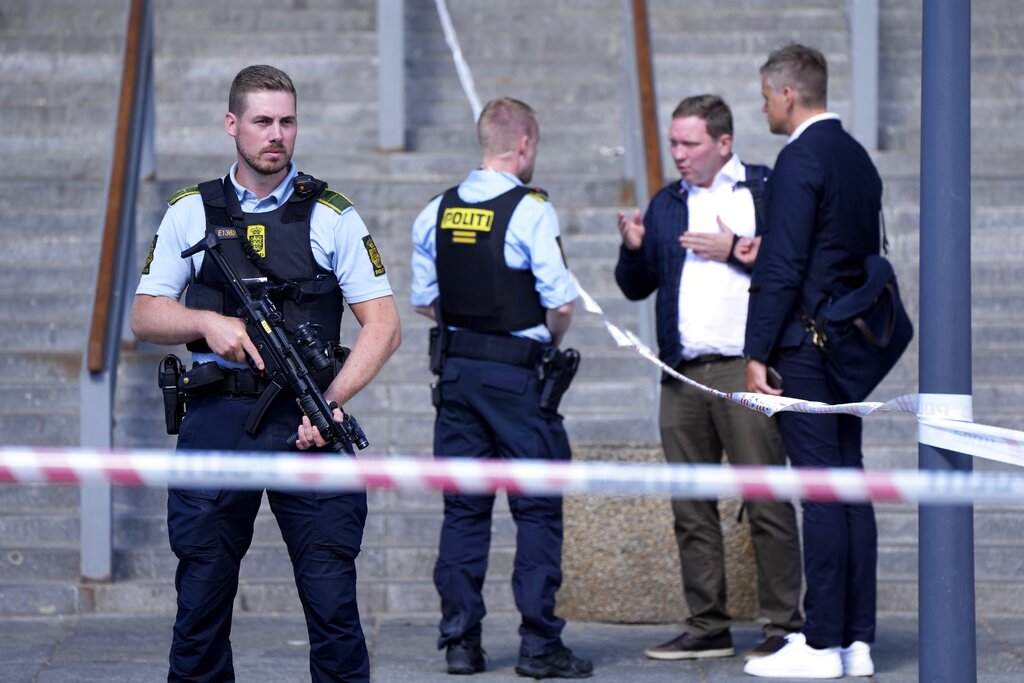COPENHAGEN — Denmark was shaken to its core in July when a 22-year-old opened fire in Copenhagen’s Field’s mall, killing three people and injuring several others.
Home to some of the strictest gun laws in Europe, the shooting left many wondering what the Danish government would do to prevent similar tragedies from happening again.
However, unlike in the United States, that debate has not focused on whether the government should impose further gun restrictions but rather on treating the mentally ill.
Not long after the July 5 shooting, Danish law enforcement revealed the shooter was suffering from a mental illness. He even attempted to get help through a psychiatric support line shortly before the incident, according to public broadcaster DR. The man also allegedly posted multiple videos on social media one day before the shooting, posing with weapons while talking about psychiatric medication “that does not work,” according to the Local DK.
JUDGE BLOCKS NEW YORK FROM BANNING GUNS IN HOUSES OF WORSHIP IN VICTORY FOR SECOND AMENDMENT
Sarah Munch, 19, an employee at the clothing store Bahne in the mall who was working during the shooting. “Something failed him. … You can’t always count on them,” she said. “And we know that because there’s a lot of people in this country, and you can’t take care of all [of] them. But something needed to happen.”

Mads, a 24-year-old employee at shoe store Deichmann agreed, saying, “If we had better, like, care for psychologically ill people or had a better system to that, this might have been avoided.”
Matilda, a 27-year-old worker at the Copenhagen Botanical Gardens, also believes the government should take action.
“I had an expectation afterwards to the government to take care of issues that are such a long waiting time for getting help with mental issues,” she said. “I think that’s totally wrong. In a society like Denmark, that should be easy and faster.”
Denmark’s emphasis on treating mental illnesses to solve gun violence is in stark contrast to the U.S.
Immediately following the tragic school shooting in Uvalde, Texas, in May, gun control activists rallied to urge lawmakers to pass stricter gun laws.
While President Joe Biden supported the message and also called on Congress to act, many Republican lawmakers, including Sen. Ted Cruz (R-TX), instead proposed increased security measures in schools such as limiting door access or arming school staff.
Ultimately, Congress passed the Bipartisan Safer Communities Act, which included enhanced background checks for people looking to buy a gun between 18 and 21 years old. It also closed the “boyfriend” loophole among gun purchasers, adding romantic partners to the list of domestic abusers who cannot buy guns.
Three months after the Copenhagen shooting, many Danes are not clamoring for similar restrictions, pointing to their already strict laws.
“If the Danish government said we have to have metal detectors on every entrance, I think people would go mad,” said Heidi, a 38-year-old union representative at Magasin. “They would not deal with it at all. … We’re going to make everybody scared for just going grocery shopping or buying a new jacket.”
In Denmark, in order to own, carry, or use firearms and other dangerous weapons, citizens must acquire a police permit and show a genuine reason for why they will need the firearm, such as hunting or collecting.

Before permits are granted, law enforcement carries out personal checks to ensure it is safe for them to own the weapon. While additional restrictions apply, every Dane interested in purchasing a gun must be at least 20 years old as well as an active member of a shooting association for at least two years, according to DR. However, residents can purchase a rifle at 18.
While no major action has been publicly taken or discussed on new restrictions, a task force organized by the Capital Region in Denmark investigated failings in the nation’s psychiatric treatment of the July shooter.
On Oct. 11, the task force revealed that while there are areas the Ministry of Health can improve in future treatment, such as increased use of violence risk screening among outpatients and more systemic assessments on the side effects of medication, it remains unclear if had those measures been in place whether the shooting could have been avoided.
As Denmark looks to solve the problem of gun violence at its root cause, some gun rights activists have suggested the U.S. could learn from the debate.
“Mass shootings are rare. This is not an incident of regular violent crime but rather an issue of someone mentally unstable who could have been stopped if all the red flags were properly reacted to,” said Irina Tsukerman, a national security lawyer and pro-gun analyst. “Given that most people are law-abiding, gun crime is not a serious problem, so the resources should be allocated to where it makes most sense to emphasize prevention.”
CLICK HERE TO READ MORE FROM THE WASHINGTON EXAMINER
Tsukerman noted that a focus on mental health awareness “should be significantly greater” in the U.S.
“Mental health and a culture of firearm safety are particularly important since it makes sense to focus on what can be changed, not on what cannot,” she said.

